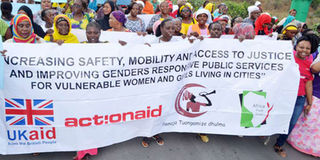We must all speak out in fight to end gender-based violence

Mombasa women protesting gender violence at Kibarani on February 28, 2017. At the heart of the violence is power and how it is used by an individual or individuals. PHOTO | KEVIN ODIT | NATION MEDIA GROUP
What you need to know:
- GBV is often about the inferior role that women and girls are typically assigned in many societies.
- Laws on their own will not have the intended impact if ordinary citizens do not join the fight against GBV.
Each year between November 25 and December 10, the 16 days of Activism Against Gender-Based Violence Campaign is commemorated globally.
It is an annual reminder of the universal nature of gender-based violence and the need for solidarity to prevent and respond to it.
Since 1991, when the campaign was first initiated, there has been a growing movement of ordinary citizens taking up the call in public and private spaces.
VULNERABLE PEOPLE
The UN’s theme this year, ‘Leave no one behind: End violence against women and girls’, ties in with the original idea that everybody has a role to positively shape the current narrative around gender-based violence (GBV).
Ordinary citizens can ensure that we all help end GBV and speak out to support outreach to the most overlooked survivors of violence including women and girls living in informal settlements, those displaced by violence, refugees, minority ethnic groups and those living with physical and mental disabilities.
The numbers in Kenya show the widespread nature of gender-based violence, with those most affected being women and girls.
SEXUAL VIOLENCE
The 2014 Kenya Demographic Health Survey found that 14 per cent of women aged 15 to 49 have experienced sexual violence.
The survey also found that 47 per cent of women have experienced physical or sexual violence.
A 2014 survey on violence against women in Europe found that one in 10 women have experienced some form of sexual violence since the age of 15.
It also reported that one in three women (33 per cent) have experienced physical and/or sexual violence from the age of 15.
HARASSMENT
The growing numbers of women and, in some instances, men who are coming forward with accusations of years of sexual harassment and assault by well-known, household name actors and directors has revealed the depth of the situation in the US, once again pointing to the global nature of GBV.
It also reveals another concern, that the true picture is often obscured by under reporting, a culture of silence and impunity.
At the heart of the violence is power and how it is used by an individual or individuals, to subdue and control another person.
POWER
GBV is often about the inferior role that women and girls are typically assigned in many societies.
It is fuelled by unequal power relations, for example, young girls and women forced into unsafe transactional ‘sexual relationships’ to earn a living, or vulnerable girls and women preyed upon by men.
Violence against women in elections is driven by the idea that women should not take part in elective politics.
It takes just one person to speak out, and create a tsunami of outrage and encourage more survivors to come forward.
JUSTICE
In 2014, at the height of sexual assaults of women in public transport in Nairobi, a group of women and a few men came together to lobby for action under the banner of the ‘My Dress My Choice’ campaign.
Their collective voice was so powerful that President Uhuru Kenyatta strongly condemned the assaults and called for swift action.
Recently, two of the perpetrators were sentenced.
Equally we have seen rates of Female Genital Mutilation among young girls coming down because of the activism of concerned citizens.
These campaigns and many others around the country can in part be attributed to years of advocacy by civil society mainly led by women.
ACTIVISM
Laws on their own will not have the intended impact if ordinary citizens do not join the fight against GBV.
This year, we also call on Kenyan men and boys to find their space and use their voice to speak out.
Their role is important in shaping the narrative and holding fellow men accountable for their role in perpetrating GBV.
We urge them to speak out.
Speak out not only because this could be your sister or wife or mother or daughter.
Speak out because it is the right thing to do and GBV is a human rights violation that has no place in our homes, workplaces or public spaces.
CIVIL SOCIETY
Sweden, working with UN Women and civil society groups in Kenya, has over the years supported this Campaign and other interventions against GBV.
To end GBV we must ensure that nobody is left behind.
That, all survivors can access services and justice.
We must speak out for the most vulnerable members of society.
This year, as we mark the 16 Days of Activism Campaign, we challenge everyone not to be bystanders but to speak out.
Ms. Anna Jardfelt is Sweden’s Ambassador to Kenya. Ms Zebib Kavuma is the Country Director of UN Women, Kenya.



